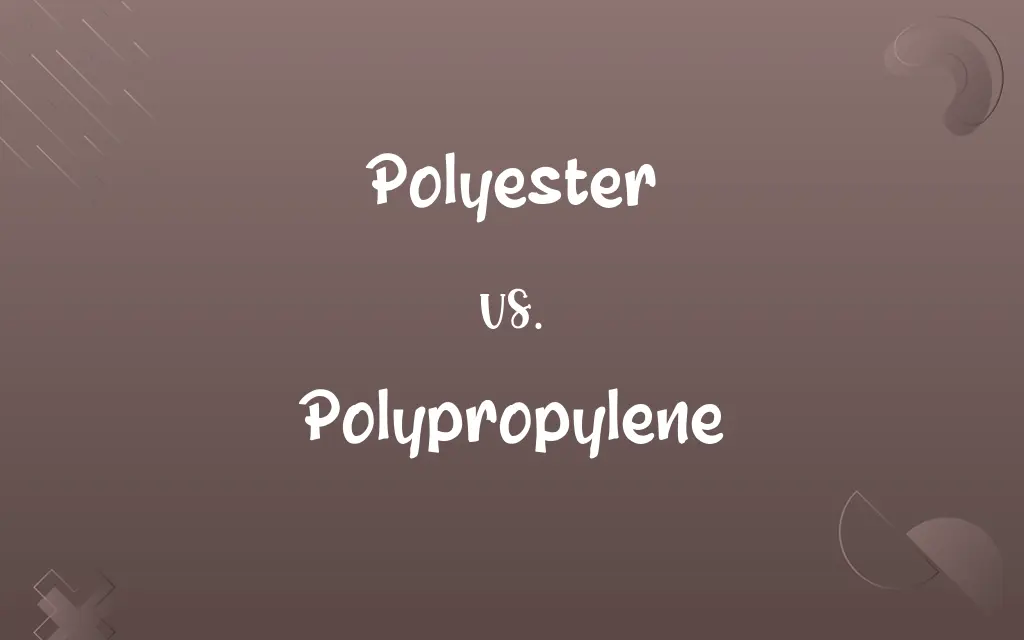Polyester vs. Polypropylene: Know the Difference

By Shumaila Saeed || Published on January 14, 2024
Polyester is a synthetic fabric known for durability and resistance to wrinkling and shrinking, while Polypropylene is a thermoplastic polymer known for its lightweight, strong, and moisture-resistant properties.

Key Differences
Polyester is a synthetic fiber used widely in clothing, known for its strength, durability, and resistance to wrinkles and shrinking. Polypropylene, a type of plastic, is praised for its chemical and moisture resistance, often used in packaging, labeling, and reusable containers.
Shumaila Saeed
Jan 14, 2024
In the textile industry, polyester is favored for its ability to retain shape and resist stains and fading. In contrast, polypropylene is used in carpets and rugs for its ability to repel water and resist wear.
Shumaila Saeed
Jan 14, 2024
Polyester fabrics are commonly used in a variety of apparel due to their blendability with other fibers. Polypropylene, with its higher melting point, is often used in thermal clothing and heat-resistant fabrics.
Shumaila Saeed
Jan 14, 2024
Environmental impact-wise, polyester production involves significant water and energy consumption. Polypropylene, while also a petroleum-based product, tends to have a lower environmental footprint in production.
Shumaila Saeed
Jan 14, 2024
In durability, polyester fibers are known for their longevity and ability to withstand multiple washes. Polypropylene fibers, while strong, can be prone to UV degradation if not treated.
Shumaila Saeed
Jan 14, 2024
ADVERTISEMENT
Comparison Chart
Durability
Highly durable, resists wrinkles
Strong but can degrade with UV exposure
Shumaila Saeed
Jan 14, 2024
Environmental Impact
Higher water and energy consumption
Lower environmental footprint than polyester
Shumaila Saeed
Jan 14, 2024
ADVERTISEMENT
Polyester and Polypropylene Definitions
Polyester
A material often used in outdoor and performance wear.
Her hiking gear was primarily made of polyester due to its quick-drying properties.
Shumaila Saeed
Dec 15, 2023
Polypropylene
A material often used in packaging and labeling due to its strength.
The labels were printed on polypropylene for extra durability.
Shumaila Saeed
Dec 15, 2023
Polyester
A synthetic fiber used in textiles.
Her dress was made of a lightweight, breathable polyester blend.
Shumaila Saeed
Dec 15, 2023
Polypropylene
A lightweight, strong plastic commonly used in textiles, especially for moisture-wicking properties.
His workout clothes were made of polypropylene to keep him dry.
Shumaila Saeed
Dec 15, 2023
Polyester
A fabric known for its durability, resistance to wrinkles, and ease of care.
He preferred polyester shirts for their low maintenance.
Shumaila Saeed
Dec 15, 2023
ADVERTISEMENT
Polypropylene
A thermoplastic polymer used in a variety of applications.
The storage containers were made from durable polypropylene.
Shumaila Saeed
Dec 15, 2023
Polyester
A synthetic material commonly blended with natural fibers.
The polyester-cotton blend offered both comfort and durability.
Shumaila Saeed
Dec 15, 2023
Polypropylene
A type of plastic known for its resistance to chemicals and moisture.
Polypropylene bottles are ideal for storing cleaning solutions.
Shumaila Saeed
Dec 15, 2023
Polyester
Any of numerous synthetic polymers produced chiefly by reaction of dicarboxylic acids with dihydric alcohols and used primarily as light, strong, weather-resistant resins in boat hulls, textile fibers, adhesives, and molded parts.
Shumaila Saeed
Dec 13, 2023
Polypropylene
A plastic frequently used in household goods and automotive parts.
The kitchen utensils were made of food-safe polypropylene.
Shumaila Saeed
Dec 15, 2023
Polyester
A wrinkle-resistant fabric of fibers made from any of these resins.
Shumaila Saeed
Dec 13, 2023
Polypropylene
Any of various thermoplastic polymers of propylene. They are hard and tough, and are used to make molded articles and fibers.
Shumaila Saeed
Dec 13, 2023
Polypropylene
A thermoplastic resin made by the polymerization of propylene, and used for films, fibres, or moulding materials. Also known as polypropene.
Shumaila Saeed
Dec 13, 2023
Polypropylene
A polymer of propylene used as a thermoplastic molding material
Shumaila Saeed
Dec 13, 2023
Polyester
Any of numerous synthetic resins; they are light and strong and weather resistant
Shumaila Saeed
Dec 13, 2023
Polyester
A complex ester used for making fibers or resins or plastics or as a plasticizer
Shumaila Saeed
Dec 13, 2023
Polyester
A category of polymers used in making a variety of products.
The polyester resin was used to create durable plastic bottles.
Shumaila Saeed
Dec 15, 2023
Repeatedly Asked Queries
What is polyester?
Polyester is a synthetic fabric known for its durability, resistance to wrinkles, and easy care.
Shumaila Saeed
Jan 14, 2024
Is polyester water-resistant?
Polyester is less water-resistant compared to polypropylene but does dry quickly.
Shumaila Saeed
Jan 14, 2024
What is polypropylene?
Polypropylene is a thermoplastic polymer known for its strength, chemical resistance, and moisture repelling properties.
Shumaila Saeed
Jan 14, 2024
Is polypropylene environmentally friendly?
Polypropylene is a petroleum-based plastic but generally has a lower environmental footprint compared to polyester.
Shumaila Saeed
Jan 14, 2024
Can polyester be recycled?
Yes, polyester can be recycled, although the process can be complex.
Shumaila Saeed
Jan 14, 2024
Can polypropylene be used in food packaging?
Yes, polypropylene is often used in food packaging due to its food-safe properties.
Shumaila Saeed
Jan 14, 2024
Can polyester blend with other fabrics?
Yes, polyester is often blended with other fibers like cotton for improved comfort and durability.
Shumaila Saeed
Jan 14, 2024
Is polypropylene resistant to chemicals?
Yes, polypropylene is highly resistant to chemicals, making it ideal for containers and lab equipment.
Shumaila Saeed
Jan 14, 2024
How is polypropylene used in textiles?
Polypropylene is used in moisture-wicking fabrics, thermal wear, and in carpets and rugs.
Shumaila Saeed
Jan 14, 2024
Is polyester good for outdoor clothing?
Polyester is commonly used in outdoor and performance wear due to its quick-drying and durable properties.
Shumaila Saeed
Jan 14, 2024
Are polyester fabrics comfortable to wear?
Polyester fabrics are durable and maintain their shape, but they may be less breathable compared to natural fibers.
Shumaila Saeed
Jan 14, 2024
How does UV exposure affect polypropylene?
Polypropylene can degrade with prolonged UV exposure unless it is treated or stabilized.
Shumaila Saeed
Jan 14, 2024
Is polyester suitable for sensitive skin?
Polyester might irritate sensitive skin; natural fibers are often recommended for sensitive skin types.
Shumaila Saeed
Jan 14, 2024
What is the environmental impact of producing polyester?
Producing polyester involves significant water and energy consumption, contributing to its environmental impact.
Shumaila Saeed
Jan 14, 2024
Does polyester retain color well?
Polyester holds color well and is resistant to fading.
Shumaila Saeed
Jan 14, 2024
Is polypropylene good for rugs and carpets?
Yes, polypropylene is used in rugs and carpets for its resistance to stains and moisture.
Shumaila Saeed
Jan 14, 2024
Can polypropylene be used in thermal clothing?
Yes, polypropylene's high melting point makes it suitable for thermal clothing.
Shumaila Saeed
Jan 14, 2024
What are the melting points of polyester and polypropylene?
Polyester melts at around 250-300°C, while polypropylene has a higher melting point of around 160-170°C.
Shumaila Saeed
Jan 14, 2024
Can polypropylene be used in automotive parts?
Yes, polypropylene is often used in automotive parts due to its strength and durability.
Shumaila Saeed
Jan 14, 2024
How does washing affect polyester fabrics?
Polyester fabrics are durable and can withstand multiple washes without significant wear.
Shumaila Saeed
Jan 14, 2024
Share this page
Link for your blog / website
HTML
Link to share via messenger
About Author
Written by
Shumaila SaeedShumaila Saeed, an expert content creator with 6 years of experience, specializes in distilling complex topics into easily digestible comparisons, shining a light on the nuances that both inform and educate readers with clarity and accuracy.









































































